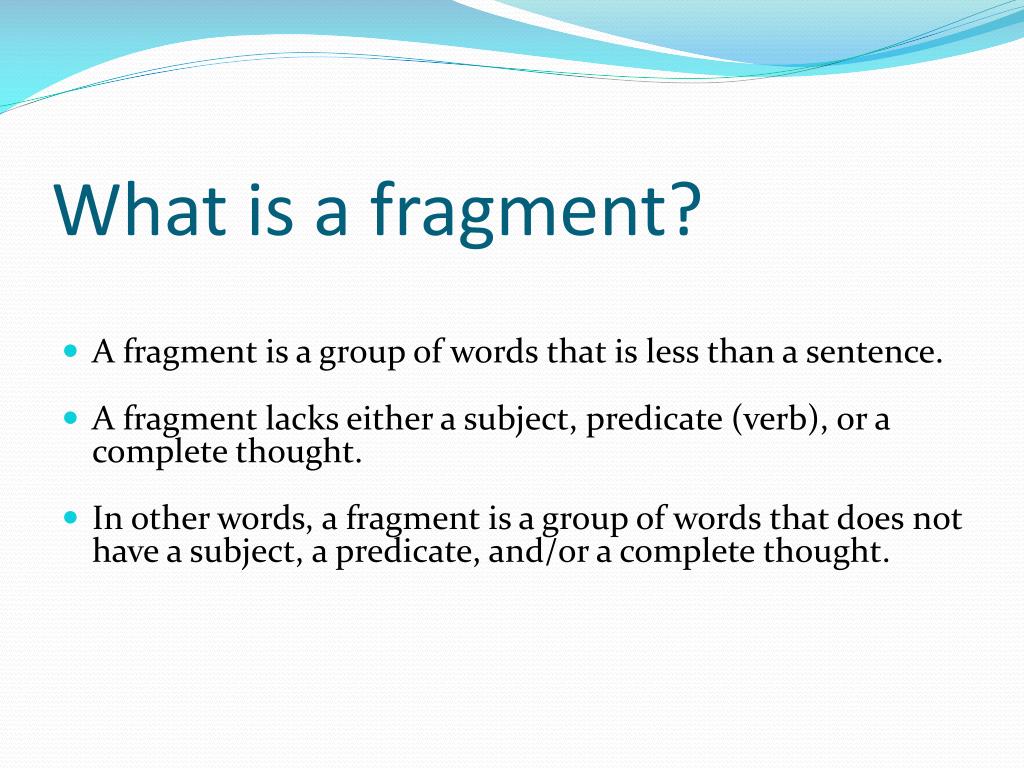
"International Standard Bible Encyclopedia". The Revised Version (British and American) has in each instance "broken pieces." The change is important because it shows that the pieces left over were not mere fragments or crumbs left by the people after eating, but some of the original pieces into which it is said in all the synoptic narratives and references Jesus "broke" the "loaves," which, being thin cakes, were usually broken before distribution hence, the phrase, "breaking of bread." See Hastings, Dictionary of the Bible (five volumes), under the word "Fragment" Weymouth translates "broken portions," namely, "those into which the Lord had broken the loaves not mere scraps or crumbs." It is the translation of klasma (from klao, "to break"), "a piece broken off" ( Matthew 14:20 the King James Version) "broken meat" ( Matthew 15:37). For example, fragmentation of thinking (typically termed loosening of associations) is a disturbance in. A part broken off, something cut or detached from the whole, something imperfect. division or separation into pieces or fragments. From A Poet’s Glossary The following definition of the term fragment is reprinted from A Poet's Glossary by Edward Hirsch. "Fragment," a piece broken off, occurs only in the plural, in the accounts of the miracles of the Loaves in the Gospels and references thereto. A fragment is a part of a larger work or a poem made to appear discontinuous or incomplete. The new inventions, discoveries and new concepts also emerge as paradigm-breaking fragments in our evolution.Encyclopedias - International Standard Bible Encyclopedia - Fragment Fragment after fragment we collect evidence to build new theories. Our history also depends on different fragments of discovery and interpretations of “the truth”. Fragment after fragment we create our culture, civilization and reality at large. If you take a high panoramic look above this world, you’ll see that this world is divided into fragmented branded truth zones: we live in a fragmented civilization with fragmented indoctrinations. This inherent nature of fragmentation is the true face of our “real” reality: the pathway of how reality discloses itself in our mind and in front of our eyes.įragment after fragment we travel our existence. To some extent, this “fragmented existential trance” creates the real universe we live in. Everything you think connects with some fragments in our mind as if mixing some exotic cocktail of different fragments that would make sense of this world. We make sense and meaning of this world through the combinatory art of fragments in our minds: we recall our memories as fragments of the past, our future visions and dreams also emerge as some fragments of our imagination, and we encounter new information as new incoming fragments. Fragmented is perhaps most often applied to abstract or intangible things like this, in which case it usually means disorganized or disunified in some way. Such an empire could be described as fragmented. Our attention is all the time focused on some fragment of our interest or focus. As a verb, fragment can mean to break into pieces or disintegrate, as in The empire fragmented into multiple states after the emperor’s death. In a fragmented manner we encounter various phenomena: meeting different people, hearing different stories, entering different physical spaces as contextual fragments: our homes, rooms, streets, offices, etc. We sense time in fragments of doing something. From a wider perspective, our reality could be viewed as a “fragmented flow” or, even, as a “fragmented existential trance”: our mind jumps from one fragment to another all the time. The exploration of Fragmentism is extensive wherever you look, everything seems to have a fragmented nature.

In a fragmented manner we move through our reality: we enter different spaces, meet different people, and hear different stories… We travel our existence in fragments.

In the same fragmented pattern our attention travels from one moment to another, from one fragment to another by shifting its focus. Our thinking consists of fragments and transitions in fragments.įor instance, our thinking emerges as a result of connecting different fragments of knowledge and perception: you are reading right now this text and your mind is connecting some fragment after fragment to make sense of it.

Our life moments consist of fragments and transition in fragments. If you think deeper, what we call our “reality” is, actually, our fragmented existential “consumption”: our existence is broadcasted on a fragmented dimension.


 0 kommentar(er)
0 kommentar(er)
